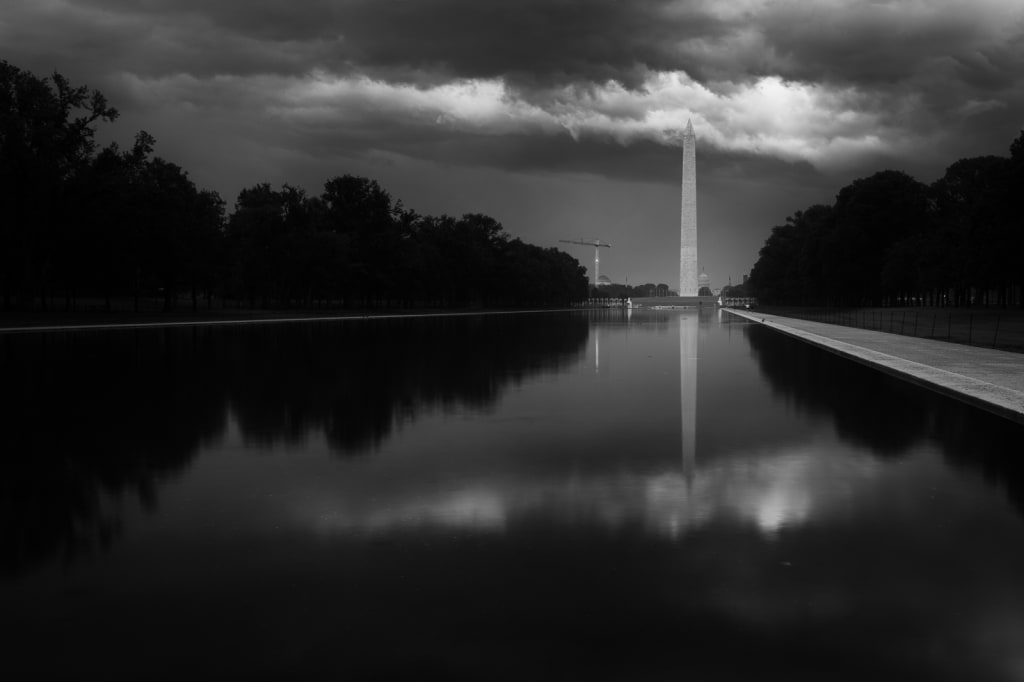U.S. Contemplates Civil War
The possibility of a violent political collapse is preoccupying America, one year on from the insurrection. Now what?

It is the ultimate national taboo, at once wholly unimaginable and utterly terrifying to consider. It is an outcome so horrific it is said that it’s dangerous even to discuss, lest its dark sorcery somehow manifest through words, and ignite the real thing. It is a literal national suicide.
Yet for many Americans on both sides of the country’s knifelike political divide, the idea that our current political dysfunction might lead to a devastating civil war has become a nightmarish preoccupation. It’s a notion that is becoming increasingly difficult to banish from our frayed national consciousness, as our troubled politics continue to steadily deteriorate, and as 2024 fast approaches.
Indeed, it feels like that old thought experiment, where a person is told not to think about elephants, and then asked what they’re thinking about. Invariably, the answer is elephants. A year out from the brutal assault on the U.S. Capitol, and Donald Trump’s campaign to delegitimize the 2020 election to keep his grip on the presidency, America finds itself incapable of subduing its grim musings about the possibility of its own imminent political collapse.
That alone speaks volumes. It seems America is thinking about elephants.
A warning
A recent op ed in The Atlantic with the apt title, Dangerous Prophecies, gives some sense of the pervasive anxiety and the sheer maddening tension that is constricting public life in the United States in recent years. It seems like one could conceivably cut the political pressure with a dull knife.
Fintan O’Toole, the author, was born in Ireland amid the sectarian bloodletting known as The Troubles, and he’s warning that this nascent belief among Americans of an oncoming civil war could in fact become a kind of self-fulfilling vision.
Indeed, he writes “Once that idea takes hold, it has a force of its own. The demagogues warn that the other side is mobilizing. They are coming for us.” It seems that where this author is perhaps mistaken, is that this notion is just now taking hold. Rather, it’s been here for quite some time.
The demagogues have already loudly made their dark warnings, and reaped their vast political windfall. This and whatever follows is simply the aftermath.
America’s political collapse was priced into Donald Trump’s presidency. It meant the failure of our democracy, but it began a few years earlier, when the insurgency was born. Indeed, failure was the point.
A political insurgency
It began as a bitter blanket defiance by Mitch McConnell’s Republican Party of Barack Obama’s entire presidency, and it became the guide to a novel kind of political opposition in America. It was politics based on unspoken racial and tribal allegiances, birthed in the trenches of the American culture wars.
It was then amplified to earsplitting levels by opportunistic Republicans who quickly discovered that sabotage and obstruction could be far more politically useful than the slog of governance.
Any notion of a collective national wellbeing was drowned out by partisan acrimony. The maxim was: “Anything that hurts the other side is good, even if it is bad for the country.” This destructive impulse radiated outward from American politics into American culture, finding its culmination in Donald Trump.
The birther theory that claimed Barack Obama wasn’t born in the U.S. became the bridge connecting a narcissistic real estate hustler devoid of morality, and a Republican Party devoid of scruples. They complemented one another perfectly. The celebrity golf hustler and the moralizing political party joined forces to resist the forces of communism, they said.
Donald Trump perfected this new us-and-them political formula, and he found overwhelming success in his pursuit of the division of America into even further opposing camps. His entire electoral strategy as a candidate was predicated on his ability to generate maximum distrust between America’s partisans, and then to exploit the resulting hostility to his own advantage.
The maxim during Trump’s presidency evolved and became: “Anything that is good for me personally is good, even if it is bad for the country.” The Republican Party organized thusly, with notably few exceptions.
He was the divider-in-chief for four long and bitter years of combat, as political attacks and congressional investigations into his fumbling wrongdoing fueled his seething hatred for “the enemy.” Donald Trump’s gift was that he was able to turn his personal hatred into mass hatred experienced intimately by his loyal followers. He used this gift with relish, demanding utter loyalty among elected Republicans, as in a medieval court.
In this way, American politics became an existential struggle for survival, almost by design. January 6 was its latest apogee, but not the end.
It was a masterpiece of demagoguery, one the Republican Party felt content to ride to electoral success across the country, seizing the presidency and the supreme court in the process. They tolerated, embraced, or ignored the rising danger, refusing to break with their president despite his increasingly destructive politics.
Now we are at a late date, reaping the bitter fruits of Donald Trump’s extravagant success in his project of division, as our electoral democracy tries to right itself after being laden with explosive lies. A new kind of presidentially-inspired political violence has been unleashed that will be difficult to put back in the bottle from whence it came.
A national darkness
Fintan O’Toole is correct in his final analysis that these ideas possess a savage dark energy all their own. That’s why talk of a civil war in America feels so utterly taboo. The more plausible it is, the more forbidden its mention becomes.
Right now, it’s unmentionable. Americans can feel the political vise tightening, even if many can’t quite articulate the reasons or the cause.
It’s heavy and hanging in the air like a cloud. Americans sense its presence, like a noxious chemical irritating our collective throat. Instead of unifying us, the pandemic only cleaved us even further apart.
Civil war is the national moral equivalent of suicide. It means a country’s political differences cannot be resolved through any deliberative process, and that it is abandoning that process for violence. It is the gravest national failure, bloody and nightmarish. It means democracy has failed.
After all, the entire purpose of American democracy is to work out our political differences without resorting to political violence. That seems to be the primary utility of any democratic government to its population, to keep it safe and secure. A civil war is by definition a profoundly masochistic act, for a country to deploy the savagery of modern warfare on itself and its own people to resolve tough political questions.
The brink of what?
America can still walk itself back from this brink that it’s approaching. Nothing is predetermined, and nothing assured. We can find a path out of all this darkness in our politics, but time is running short.
As the 2024 presidential election comes at us with the speed of a demon, and with our Democratic president and his majority in congress unable to pass their agenda, it appears that our political dysfunction is greater than our ability to overcome it. Simultaneously, Donald Trump’s nefarious political career continues out of office, and he says he is going to run in 2024.
I believe him. He has an iron grip around the neck of the Republican Party, and the nation. Like a political alchemist, Donald Trump turned January 6 into more power on the American right, rather than his own downfall.
The question now is this: how long can we continue this way, with American politics spectacularly failing to deliver the results voters crave? Not long. As the year 2022 comes into being, I fear that our Democratic system’s failings are becoming more readily apparent, as opposed to being resolved.
When a single West Virginia senator who is personally financially invested in the fate of fossil fuels can stymie the entire American agenda to combat climate change as it’s swirling around our heads in the form of wildfires and insane storms, you realize that the system itself is no longer functioning properly. Yet we already knew that, didn’t we? Yes, we did.
As the midterm elections and then 2024 comes at America like an oncoming train, many of us are deeply afraid it might mean our national collapse. Some of us on the far-right and anarchic left are hoping it is our national collapse.
Eventually, something just has to give. Let’s hope it isn’t America itself.
Happy New Year, I suppose.
A.
About the Creator
Alexander Ziperovich
I am an essayist, opinion columnist, and political analyst.






Comments
There are no comments for this story
Be the first to respond and start the conversation.